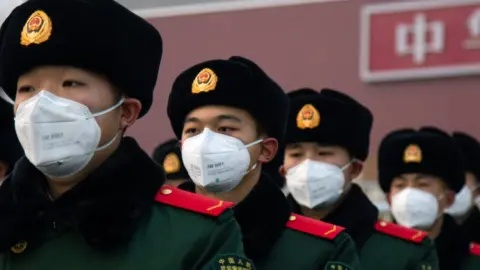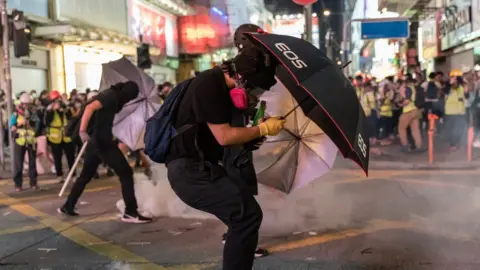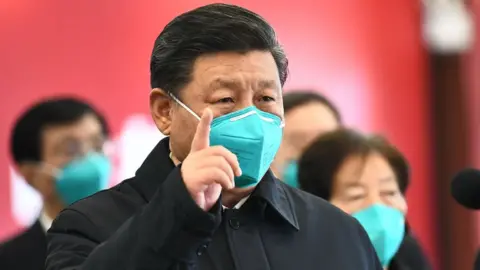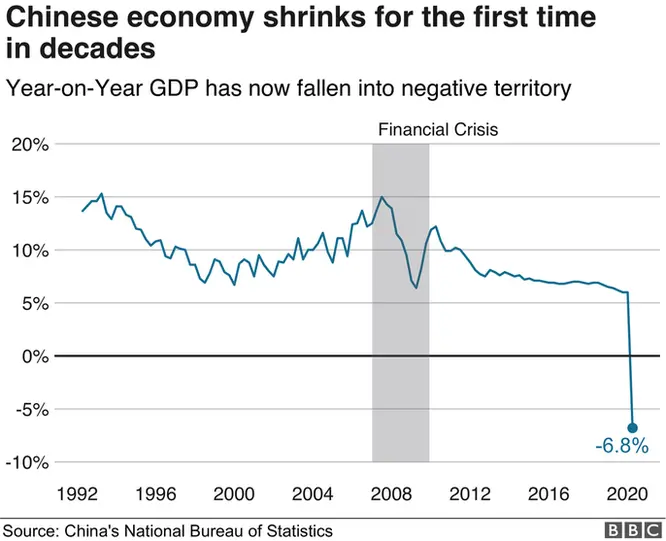NPC: China's congress will be about Hong Kong, the virus and the economy
 Getty Images
Getty ImagesChina's National People's Congress is a key date in Beijing's choreography of politics and power and despite the coronavirus pandemic, this year's focus is a controversial security law aimed at silencing Hong Kong's protests.
What is the context?
The annual meeting is usually scheduled for early March but was postponed due to the virus. It now takes place as the country emerges from the crisis - and seeks to bolster its authority both on the domestic and the global stage.
So while the expectation was for a show of confidence and triumph over the pandemic, the framing shifted dramatically when Beijing announced the discussion of a new national security law for Hong Kong, likely to inflame tensions in the territory.
The law could seriously curb freedoms in Hong Kong and comes after waves of pro-democracy protests that have sometimes turned violent - and have always angered Beijing.
Yet despite Hong Kong topping the agenda, the fallout from the pandemic remains a challenge the NPC will discuss as well.
China is where the pandemic started and, as much as the delay of the congress highlighted the severity of the crisis, its rescheduling is a show of strength - a sign, Beijing hopes, that things are under control.
The economic fallout, though, remains dramatic - in the first quarter, China's GDP contracted for the first time in decades.
Added to those domestic challenges, Beijing is facing increasing scrutiny and criticism from abroad over what it did - and didn't do - when the virus emerged.
What is the National People's Congress?
The NPC is China's parliament, the top legislative body. It usually meets once a year in early March and is all about economic targets, approving budgets, and passing legislation.
Although in theory the country's most powerful institution, it is seen as largely a rubber-stamp assembly in Beijing's theatrics of democracy. It approves what has been decided beforehand.
Nearly 3,000 delegates from around the country are gathering for 10 days in Beijing, representing provinces, autonomous regions, the special administrative regions of Hong Kong and Macau, as well as the armed forces.
Parallel to the NPC there's also the Chinese People's Political Consultative Conference (CPPCC), the most powerful political advisory body in the country.
Why is the Hong Kong proposal controversial?
The territory falls under a "one country, two systems" policy and has had a "high degree of autonomy" since Britain returned sovereignty to China in 1997.
The proposed new security law could ban sedition, secession and treason which means any protests could be punished much more severely than in the past.
When the Hong Kong government tried to pass similar legislation in 2003, about 500,000 people took part in street protests against it, and it was eventually shelved.
 Getty Images
Getty ImagesA spokesman for the NPC said on Thursday that that legislation was "highly necessary" and would "safeguard national security in Hong Kong".
However, pro-democracy activists believe that Beijing is slowly eroding Hong Kong's judicial independence and other freedoms not enjoyed in mainland China.
What else is on the agenda?
According to state media, topping the agenda will also be: epidemic control, economic growth, poverty alleviation, employment policy, and drafting China's first civil code.
Premier Li Keqiang - the number two in Chinese politics - spoke a the opening on Friday but he omitted a 2020 target for the economy battered by the virus fallout.
 Getty Images
Getty ImagesFailure to steer the economy through the crisis could undermine Beijing's domestic legitimacy - a real problem for a party that promises growing prosperity in exchange for authoritarian rule.
Despite being accused of suppressing early warnings, China insists it alerted the world of the severity of the virus in time. Beijing says other countries simply neglected to heed those warnings.
What is the virus situation in China?
The novel coronavirus emerged in late 2019 in Wuhan in China's Hubei province but wide-ranging lockdown and quarantine measures eventually slowed the number of new infections to a single-digit trickle.
Out of about 84,000 confirmed infections, almost 80,000 have recovered while more than 4,500 have died. There are currently only a handful of active cases and lockdowns are being lifted across the country.
Concern over a second wave though remains. New clusters near the Russian border have brought home the dangers of re-importing the virus.
What about the economic fallout?
The coronavirus pandemic is expected to have a profound impact on economies around the globe.
For China, we already have a shocking data point: in the first three months of the year, the economy contracted by 6.8%, the first contraction in decades.

Although factory work is resuming, the economic and social consequences of a slowing economy will continue and notably, there will be no official target set for 2020 growth.
China has already unveiled a range of support measures to cushion the impact - though not on the same scale of some other major economies.
And with an export-dependent economy, much of the recovery will depend not just on China - but on how the rest of the world recovers.
